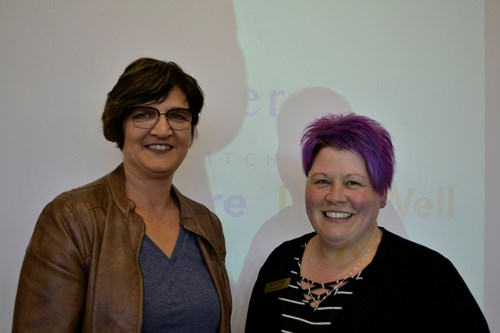�� �� �� �� �� �� The statistics are startling and the outcome - for now - is inevitable: currently, about 500,000 Canadians are affected with Alzheimer's disease and/or dementia and right now, there is no cure.
���������������������� In Saskatchewan, 19,000 people have dementia and by 2038, it is estimated that more than 28,000 Saskatchewan residents will be living with dementia if nothing changes with regards to a cure.
���������������������� “By 2038, it's estimated that 1.4 million Canadians will be affected with some form of dementia,” says Karrie McFadden, First Link Coordinator for the Alzheimer Society of Saskatchewan. “And that (number) is the population of Saskatchewan.”
���������������������� McFadden recently visited Carlyle United Church at the invitation of the Friends of Moose Mountain Lodge, where she gave a wide-ranging presentation on many aspects of the illness, including warning signs, myths about the disease, help for patients and caregivers, building dementia- friendly communities and the wide range of services and assistance provided by the Alzheimer Society of Saskatchewan.
���������������������� “I'm a registered social worker and the First Link Coordinator for the Alzheimer Society of Saskatchewan,” says McFadden. “Our goal at the Alzheimer Society is to get involved with people early on and throughout the dementia journey.”
���������������������� “We don't just work with people with Alzheimer's,” she says. “We work with people and families affected with all types of dementias. We have six resource centres in Saskatchewan and my office is in Weyburn, so right now, I'm working within the Sun Country Health Region.”
���������������������� McFadden says there are several types of dementias in addition to Alzheimer's disease, including frontal temporal dementia, vascular dementia, Lewy body disease, mixed dementia, and more.
���������������������� “This is not an exhaustive list,” she says. “Dementia is actually an umbrella term that describes a set of disorders that affects the brain.”
���������������������� “But dementia is not a normal part of aging. The exact mechanism of why it occurs is not known,” she says. “But the disease is irreversible.”
���������������������� Alzheimer's disease is a progressive, degenerative brain disease. Age is the biggest risk factor for the illness, but dementias can affect younger people, too.
���������������������� McFadden says that getting an early diagnosis from a general practitioner or neurologist is important, although she admits that can often be a challenging process.
���������������������� “The benefits of an early diagnosis allows people to understand the signs and symptoms,” she says. “ As difficult as that is, it allows the person who is diagnosed - and their family - to prepare and plan as well as access resources and supports. And often other conditions - such as urinary tract infections, for example - can mimic dementia symptoms in older people.”
���������������������� “Ideally, your GP will rule out other conditions, review and refer the individual to a neurologist,�� but that doesn't always happen, for a number of reasons. That's where the Alzheimer's Society can�� help.”
���������������������� McFadden says people with dementia often react emotionally because they no longer understand what's going on around them.
���������������������� “They can no longer function at the pace of their environment,” she says. “However, their long-term memory stays intact for most people, even well into the disease, while their short-term memory is gone early.”
���������������������� McFadden said that among its many initiatives, the Alzheimer Society of Saskatchewan also focuses on caregiver support and building Dementia Friendly Communities.
���������������������� “We need to set the person with dementia up for success,” says McFadden. “People with dementia and their caregivers need support and compassion. And although there is work going on right now to find a cure, currently in Canada, three out of four people know someone with dementia.”
���������������������� “I encourage anyone with any questions or concerns to contact the Alzheimer Society,” she says. “We have so many resources surrounding all aspects of the dementia journey - and that includes supports for caregivers.”
���������������������� “I'm here; I'm local and I'm here to provide support,” says McFadden.
���� ���������������� ��Friends of Moose Mountain Lodge founder Bertha Isleifson agrees, adding: “I'm really pleased that we were able to reach out in this way to the community. Throughout our area, we know that many of our family members, friends and neighbours are already dealing with Alzheimer's disease and other types of dementias. Our goal is to support those people and their caregivers as best we can and I hope that the information that Karrie provided here tonight goes a long way towards helping them.”
���������������������� To learn more, contact: Karrie McFadden at (306)-842-2273 or check out
��
��
�� �� �� �� �� ����




